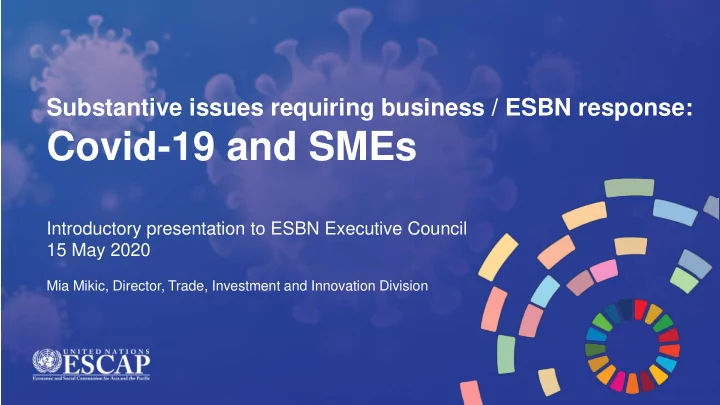

Substantive issues requiring business / ESBN response: Covid-19 and SMEs Introductory presentation to ESBN Executive Council 15 May 2020 Mia Mikic, Director, Trade, Investment and Innovation Division
Contents I. Impact of COVID-19 at macro level II. Sectoral impacts III. Impact on SMEs - results from the ESBN survey IV. Discussion
Affected both supply and demand side, Macro level impacts hurting MSMEs and workers in tourism, services and informal sectors most
Macro level impacts • GDP growth declines globally 3-6%; AP 4-6% • Trade in goods contracts globally 13 to 32%; AP 14- Predicted contraction in GDP growth, 37% trade and FDI • FDI drops by 30-40% • Business revenues down; in particular, MSMEs • Vulnerable groups: Informal/ rural workers, women, migrants, older persons, and persons with disabilities. • On the + side: environment
Most impacted sectors Tourism income as share of GDP • Accommodation and food 100 services (mobility restrictions) • Wholesale and retail trade 80 Percentage of GDP (lockdowns, demand shock) 60 • Manufacturing (break in supply 40 chains, e.g. electronics, cars) 20 • Textile and apparel (demand) 0 • Real estate, business and administrative activities (demand) (Cf. ILO Monitor, 3 rd edition)
Impact on SMEs: Survey of ESBN members Impacts: • 64.5% significantly impacted. More than 50% indicated cash flow problems, 77.4% had adapted their business model. Lessons learned: • Preparedness. Need to increase resilience of supply chains, and advance digitization Suggestions for government action: • Increase eligibility and ease of access to temporary loans, tax exemptions, rent deferrals/reductions, especially for services, tourism, and manufacturing. • e-Government: Make government services easy to access online • Improve internet speed 31 respondents (58% <50 employees; 16% <200 employees). 35% Hong Kong based, 22% in finance and accounting.
ESBN survey: Suggestions for ESBN role • Provide guidelines, frameworks and toolkits for responding to the epidemic and increase resilience. • Provide courses on how to convert to digital. • Promote sustainable supply chains and mobilize business to support changes in consumer behaviour. • Strengthen the development and use of sustainable energy. • Help governments and companies establish sustainability frameworks. • Promote investments in digitalization, automation, AI and cybersecurity.
Discussion What can ESBN do to advance MSME resilience and support building back better? For example: • Inform ESCAP’s advice to governments • Facilitate digital transformation • Engage in capacity building • …..
Thank you ESCAP’s COVID related work: https://www.unescap.org/covid19
Recommend
More recommend